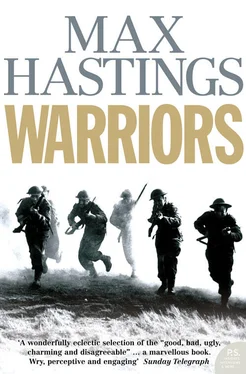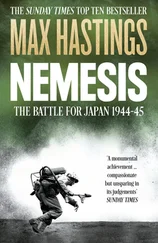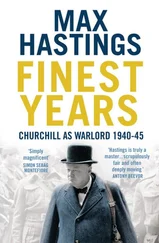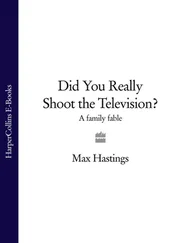The most dramatic foreshortening of Western democratic man’s assumed quotient of courage, his expected tolerance of the circumstances of conflict, took place between the two world wars. In the 1914-18 encounter, infantrymen of all the combatant powers were required to accept a level of sacrifice Bonaparte’s or Grant’s soldiers would have acknowledged with respect. A generation later, in 1939-45, a consensus evolved among Anglo-American commanders that it was impossible again to make such demands upon their men. The manner in which campaigns were conducted, especially in north-west Europe, reflected an Allied preference for firepower rather than human endeavour, a tolerance of ‘combat fatigue’ or ‘battle exhaustion’ as a recognised medical condition, and a reluctance to persist with any course of action that entailed heavy loss.
However ghastly were some individual Western Allied experiences of the Second World War, only in the Japanese, Russian and German armies were demands routinely made upon the soldier comparable with those of earlier centuries. It might be observed that ‘fanatical’ enemy behaviour which roused the dismay, even revulsion, of 1939-45 American and British soldiers was no more than had been asked as a commonplace of their own forebears: a willingness to carry out orders likely to precipitate their own deaths. After 1918, the soldiers of the Western democracies in the Second World War were deemed to have grown more ‘civilised’, a cause of lamentation among their commanders. Senior American and British officers such as Patton, Brooke and Alexander, not to mention Winston Churchill, bewailed the fact that the men whom they led possessed less capacity for suffering than their fathers who bore arms in the Kaiser’s war. The norm had changed.
Yet in every society on earth, the most durable convention from ancient times until very recently was that which held physical courage to be the highest human attribute. For thousands of years, in societies dominated by the warrior ethic, this quality was valued more highly than intellectual achievement or moral worth. A.E.W. Mason’s classic adventure story The Four Feathers (1902), set in 1898, concerns a sensitive young army officer who resigns his commission because he prefers to stay in England enjoying country life with an adored fiancée, rather than accompany his regiment up the Nile to slaughter Dervishes. His girl joins brother officers in offering him a white feather for his ‘cowardice’. He is obliged to perform extraordinary feats of derring-do in order to recover her esteem. The story has always seemed to me flawed, because it requires the hero eventually to marry this foolish creature, who surely proved her unfitness as a partner for life by placing so high a premium upon brawn over brains, preferring to see her loved one immolate himself on a battlefield rather than indulge his poetic nature.
But The Four Feathers vividly reflected the values of its period. One consequence of mankind’s exaggerated regard for ‘pluck’ is that some remarkably stupid men, their only virtue a willingness to expose their own persons to risk, have been granted positions of responsibility on the battlefield, where their follies have cost lives. Bonaparte often over-promoted officers of high courage and small intelligence, whose headlong assaults upon the enemy cost the imperial army gratuitous slaughter. General Sir Harold Alexander’s gallantry, patrician manners and dashing appearance made him Winston Churchill’s favourite general. ‘Alex’ looked the ideal of a warrior. The prime minister was content to overlook the hero’s notorious laziness and lack of intellect.
A less exalted officer who showed himself ‘brave as a lion’, to quote a comrade, leading a battalion in north-west Europe in 1944-45 had to be relieved of a brigade command in Korea in 1951. His subordinates formally protested to the divisional commander when this committed warrior, adorned with two DSOs, proposed to launch his men in a frontal assault upon the Chinese. He failed to comprehend the new terms of limited war. The American writer Ambrose Bierce a century ago advised the ambitious professional soldier: ‘Always try to get yourself killed.’ Many of those who display a willingness to pursue this objective are, however, fools by the normal yardsticks of humanity. Courage is a desirable asset in a commander, but is usually fatal to the interests of his soldiers unless accompanied by some intellectual powers. British cavalry and its senior officers were flawed through most of their history, up to and including the Second World War, by an obsessive compulsion to charge. No warrior should be promoted to higher command merely because he is brave. A skilled and eager fighter is best rewarded by decorations rather than promotion. He should be retained in a role in which he can make himself useful in personal combat, rather than advanced beyond the merits of the rather limited gift – even for a soldier – of being good at killing people.
Yet it is hard to exaggerate the influence that displays of battlefield prowess have always exercised upon others, especially adolescents who are least equipped to perceive the worth of other virtues. As a schoolboy I read a book written in the 1920s, entitled Stirring Deeds of the Great War. Works of this nature were published in great numbers from Victorian times until, say, the 1960s. They depicted war as an extension of school sports, a grander and more splendid House Final, in which young men possessed of the right stuff could win their colours on a national pitch. They were designed to inspire new generations of Englishmen and Americans to emulate the feats of their forefathers, and often they succeeded. The illustrations in Stirring Deeds left a lasting impression upon the impressionable. I remember one captioned ‘Lieutenant Smyth’s terrible journey with the bombs’. It depicted a young officer lugging a box of grenades across no man’s land amid a storm of shot and shell, an episode following which he was awarded a Victoria Cross. In those days, the public perception of heroism was almost entirely related to feats of military prowess. Until at least the 1960s, warriors who had displayed conspicuous courage in one or other of the twentieth century’s notable bouts with the Germans were treated with high respect, even if their cheques bounced.
It may be argued that portrayals of war as ‘the great game’ prostituted courage for dubious nationalistic purposes, and so they did. Yet over the past thirty years or so, the word ‘hero’, surely one of the most precious in the language, has become debased in a different way. Public admiration once reserved for warriors has been transferred to sports stars and celebrities, many of negligible attainment. Martial courage has become far less esteemed in Western societies. In part, happily, this is because the need for it in wars of national survival has vanished. Less happily, however, it is because some people in the twenty-first century recoil from any celebration of military achievement.
In the tranquil times in which we are fortunate enough to live – with or without Al Q’aeda, our ancestors would consider our era uniquely privileged – there is a public yearning to make life safe. A corollary of this is a diminution of enthusiasm for those who embrace risk. Most of the people whose stories feature in this book would find our society’s quest for an existence without peril incomprehensible, unmanly, absurd. They would be amazed by the childlike and increasingly widespread belief that if governments do their business properly, even a soldier in war can be protected from harm.
It is welcome that popular perceptions of courage no longer embrace only, or even chiefly, achievement in battle. But it seems dismaying that the media, and thus the public, today blur the distinction between a victim, who suffers terrible experiences, and a hero. To any thoughtful person, a hero must be someone who consciously consents to risk or sacrifice his or her life for a higher purpose. The media, for instance, will describe a pilot who safely lands a crippled plane laden with passengers as ‘a hero’. A party trapped for hours in a cable car who return to terra firma without betraying visible moral collapse may well be dubbed heroic. In truth, of course, these people are merely passive victims of misfortune. If they behave well, they are doing so to save their own skins, and only incidentally those of other people. Anyone who has served in a theatre of war, even in a non-combatant capacity and even in as perfunctory an affair – from the Allied viewpoint – as the 2003 invasion of Iraq, is likely to be described in any subsequent media report of a divorce, car crash or fatality as a ‘war hero’. This is a travesty. Such a word as ‘hero’ deserves to be cherished as carefully as any other endangered species. Physical bravery is found more often than the spiritual variety. Moral courage is rare, and perhaps more common among women than among men. A willingness to defy peril comes remarkably easily to some young people. For millennia, this trait was systematically nurtured in them through ‘risk’ sports, with the implicit or explicit purpose of fitting them for war. Foxhunting, for instance, which requires high courage from a ‘thruster’, created the ethos of Wellington’s army much more than did the playing fields of Eton. Such a young man as Harry Smith of the Rifle Brigade joined the British Peninsular army having already tested his own courage over a thousand fences in the hunting field. This did not make him a better or more intelligent person, but it sent him to serve Wellington as a demonstrably brave one. It is no coincidence that today, when we no longer feel threatened by foreign enemies who must be confronted in battle, English socialists are spitefully committed to banning English foxhunting. The sport reflects a culture which they despise. The virtues which hunting has fostered for centuries seem to them redundant as well as barbaric.
Читать дальше












